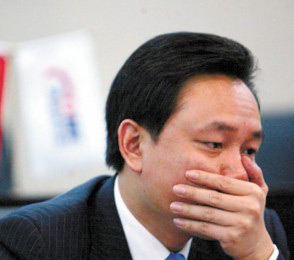
The detention of Huang Guangyu, chairman of China's biggest electrical appliance retailer, in late November 2008, came as a huge shock to the Chinese public. However, the Chinese police have been pursuing Huang since they questioned him in 2006. After two years of investigations, the police have uncovered evidence of 70 billion yuan in suspicious capital transactions under Huang's name, and have linked him with seven economic misdeeds including share price manipulation and money laundering.
On November 28, Gome Electrical Appliance Holdings Ltd released a statement admitting that its Chairman Huang Guangyu was under police investigation for alleged involvement in economic crimes. Zhou Yafei, the company's chief financial officer was also being questioned in connection with the same case, Gome noted.
The same day, officials from the China Securities Regulatory Commission (CSRC) confirmed that Beijing Eagle Investment Co Ltd – a company controlled by Huang – was suspected of manipulating the share prices of Sanlian Commercial Co Ltd, and Beijing Centergate Technologies Co Ltd.
According to the Xinhua News Agency, Huang Junqin, the elder brother of Huang Guangyu and the CEO of Beijing Towercrest Group, was also being held in custody by the Beijing police, as was the Chairman and President of Beijing Centergate Technologies Co Ltd, Xu Zhongmin.
It's time to tell the whole story.
'Seven deadly sins' with 70 bln yuan
On November 23, a police source told the Economic Observer that Huang Guangyu had been taken into custody by the Beijing police on November 19 but released three days later.
On that occasion, Huang was only questioned about the manipulation of the share prices of Beijing Centergate Technologies and Shandong Jintai Co Ltd, but the police had evidence showing that Huang was involved in suspicious capital movements totaling around 70 billion yuan, the source added.
According to the source, Huang is now suspected of seven crimes: bribing senior officials before Gome's listing in Hong Kong, and during Gome's merger with Shanghai-based electronics retailer Yongle; evading tax by injecting assets into an overseas shelf company; money laundering concerning Shandong Jintai; manipulating the share prices of Beijing Centergate Technologies and Sanlian Commercial; and transferring assets through the underground banking system.
Back in July 2006, Huang Guangyu and Huang Junqin were investigated by the police for illegally receiving 1.3 billion yuan of loans from a Beijing branch of the Bank of China more than a decade ago. On January 16, 2007, Gome announced that Huang Guangyu had been cleared of all charges.
But the police didn't remove Huang from their list of suspects.
According to police insiders, instead of the CSRC, the Ministry of Public Security (MPS) took the lead in this current investigation. Investigations have continued without a break for the past two years, but only a very few people within the police authorities kept in the loop. "Only recently was the case handed over to the Securities Crime Investigation Bureau of the MPS, and was acted on by the Beijing police," said a source close to the matter.
An industry insider suspects that Huang may have made use of the underground banking system for money laundering or transfers. On the one hand, the takeover of Sanlian Commercials and Beijing Centergate Technologies and the merger with Dazhong Electronics all required huge amounts of funds. On the other hand, although HK-listed Gome had ample capital, the Chinese government conducts strict supervision of foreign exchange inflows. As a result, it is very likely that Huang turned to China's developed underground banking system. The insider noted that many of the major players in the underground banking business come from Chaoshan, a city in south China's Guangdong Province, which also happens to be Huang's hometown.
From April to June 20, 2006, Huang spent 155 million yuan buying 29.58 percent of Beijing Centergate Technologies through Pengtai Investment Co Ltd, one of Gome's subsidiaries, becoming the company's biggest shareholder. Huang later invested more than 900 million yuan in the company through a series of injections. Based on information from the police, it was during this period that Huang was suspected of manipulating stock prices and embezzling funds.
Moreover, since last year, Huang has been transferring large amounts of capital out of the country for unknown reasons.